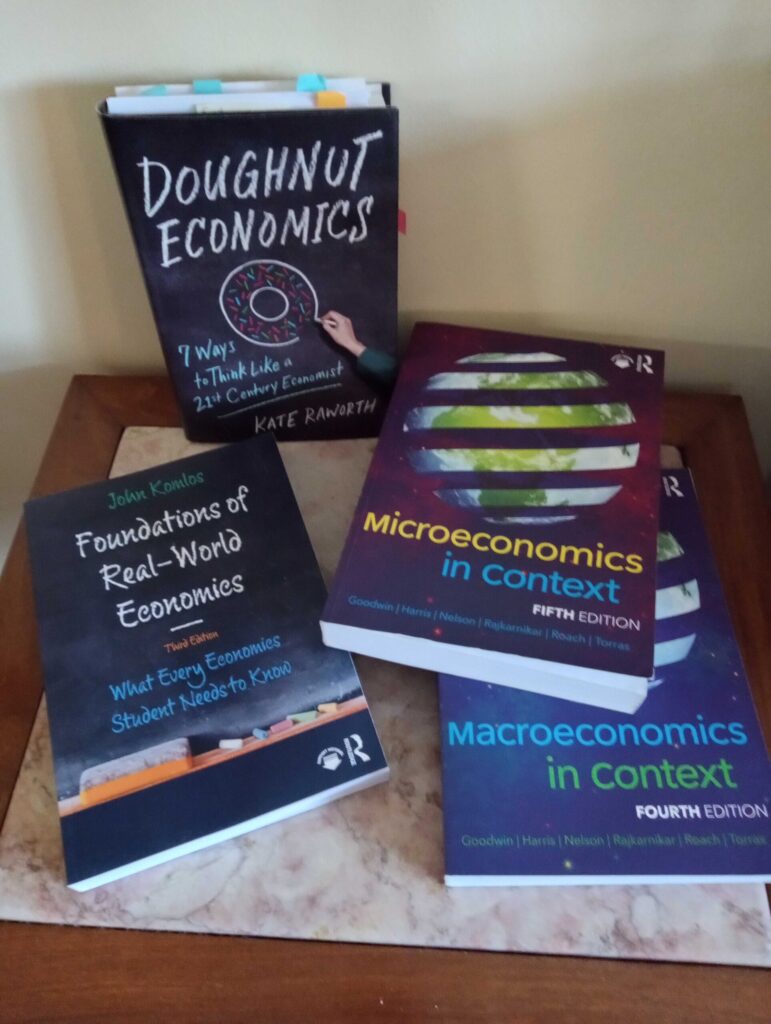

As brought together by Dave Brown, December 2024
Amid all that’s online these days, it’s helpful to have at one’s elbow “hard copies” of some up-to-date textbooks. They provide background and structure for setting current events and commentaries in perspective. I find it relaxing, after a day on the computer, to hold a textbook in hand in an easy chair, maybe with a glass of wine, to look up some topics further. Often that leads me to browsing nearby pages or the index, and dusting cobwebs off subjects I haven’t really focused on for years.
Among the books that I keep, especially in view are three recent economics texts. Part of what I like about them is that they have companion online circuits which help keep them “alive” and relevant. Let me tell you about each:
One of them is Kate Raworth’s Doughnut Economics: Seven Ways to Think Like a 21st Century Economist (White River Junction, VT: Chelsea Green Publishing, 2017).
Kate’s own explanations and updates ran until 2020, when she moved and applied her doughnut framing to Amsterdam. But others have picked up on her core ideas via a Doughnuts Action Lab.
I often refer folks who have cluttered, disjointed notions about economics issues and options to Kate Raworth’s Doughnut Diagram. Her main theme is that we all should operate within the boundaries of foresighted ecological ceilings and equitable social foundations.
Also on my keep-in-view shelf is a two-volume set from Neva R. Goodwin et al., Microeconomics in Context and Macroeconomics in Context, 5th ed. (New York, NY: Routledge, 2023).
This pair of texts stems from a broader line of collaboration among well motivated faculty and young professionals at Boston University and Tufts University. Rather than aloof topics in pricey academic journals, their emphasis is on key 21st century choices and foresighted well-being, in our local as well as national and global surroundings … and on using language that can be readily understood, rather than esoteric equations and such … and on effective ways to reach students, business and agency analysts, emerging leaders and others in the U.S. and abroad who will be key these coming decades.
They use current events, transitions and examples that non-academic readers can relate to, as starting points for better analyses. One that I much like is their November 2024 blog, “Understanding and Transitioning Towards a Circular Economy” — it urges reuse-repair-recycle, in instead of the usual make-take-waste sequence, for utilizing resources.
The BU-Tufts group also offers a more concise, single-volume Essentials of Economics in Context text. In October 2024, they announced and described an updated edition of that.
The third text on my easy-to-reach shelf is John Komlos’ Foundations of Real-World Economics: What Every Economics Student Needs to Know, 3rd ed. (New York, NY: Routledge, 2023).
It was via the World Economics Association that I recently came to know about Professor Emeritus John Komlos’ backgrounds in the U.S. and central Europe, and how he has blended analyses of economics, history, and effects on people with feelings and biological limits. His biography shows that he is one of a kind. Dr. Komlos has continued to stay in touch with world developments during retirement, and his textbook updates reflect this.
That has led to my having interesting email contacts with Professor Komlos … and to my writing a review (as yet unpublished) that shows how his text may be valuable to early-career and mature readers who are now out in the thick of things. Here is my write-up about John Komlos’ Foundations of Real-World Economics.
#############

